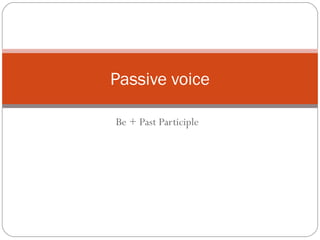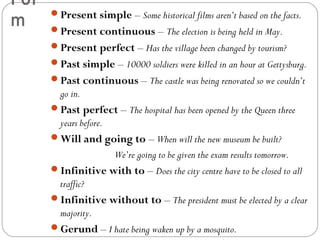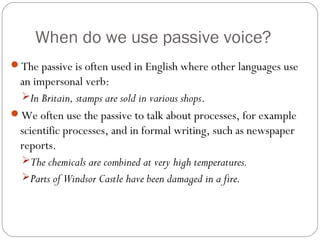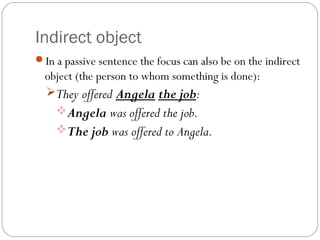Passive voice explanation
- 1. Be + Past Participle Passive voice
- 2. For m Present simple – Some historical films aren’t based on the facts. Present continuous – The election is being held in May. Present perfect – Has the village been changed by tourism? Past simple – 10000 soldiers were killed in an hour at Gettysburg. Past continuous – The castle was being renovated so we couldn’t go in. Past perfect – The hospital has been opened by the Queen three years before. Will and going to – When will the new museum be built? We’re going to be given the exam results tomorrow. Infinitive with to – Does the city centre have to be closed to all traffic? Infinitive without to – The president must be elected by a clear majority. Gerund – I hate being waken up by a mosquito.
- 3. When do we use passive voice? We often use the passive when it’s not said, known or important who does an action: My phone has been stolen. (=Somebody has stolen my phone, but we don’t know who.) If we want to say who did an action, we use by: Westminster Abbey was started by Henry III in 1245. We can often say things in two ways, in the active or the passive. Compare: Bill Bryson wrote The Lost Continent. (The focus is more on Bryson.) The Lost Continent was written by Bill Bryson. (The focus is more on the book.)
- 4. When do we use passive voice? ÔÇóThe passive is often used in English where other languages use an impersonal verb: ÔÉòIn Britain, stamps are sold in various shops. ÔÇóWe often use the passive to talk about processes, for example scientific processes, and in formal writing, such as newspaper reports. ÔÉòThe chemicals are combined at very high temperatures. ÔÉòParts of Windsor Castle have been damaged in a fire.
- 5. Indirect object In a passive sentence the focus can also be on the indirect object (the person to whom something is done): They offered Angela the job: Angela was offered the job. The job was offered to Angela.
- 6. Indirect object In a passive sentence the focus can also be on the indirect object (the person to whom something is done): They offered Angela the job: Angela was offered the job. The job was offered to Angela.





